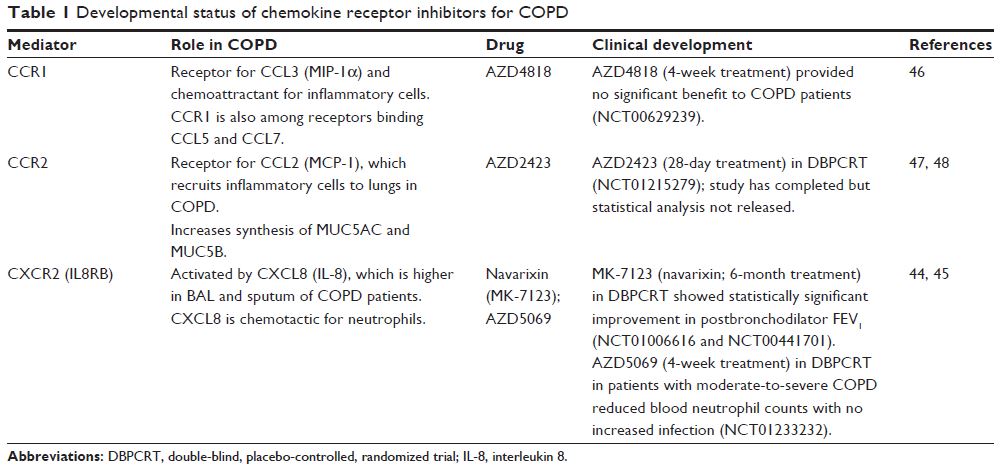109451
论文已发表
注册即可获取德孚的最新动态
IF 收录期刊
- 3.4 Breast Cancer (Dove Med Press)
- 3.2 Clin Epidemiol
- 2.6 Cancer Manag Res
- 2.9 Infect Drug Resist
- 3.7 Clin Interv Aging
- 5.1 Drug Des Dev Ther
- 3.1 Int J Chronic Obstr
- 6.6 Int J Nanomed
- 2.6 Int J Women's Health
- 2.9 Neuropsych Dis Treat
- 2.8 OncoTargets Ther
- 2.0 Patient Prefer Adher
- 2.2 Ther Clin Risk Manag
- 2.5 J Pain Res
- 3.0 Diabet Metab Synd Ob
- 3.2 Psychol Res Behav Ma
- 3.4 Nat Sci Sleep
- 1.8 Pharmgenomics Pers Med
- 2.0 Risk Manag Healthc Policy
- 4.1 J Inflamm Res
- 2.0 Int J Gen Med
- 3.4 J Hepatocell Carcinoma
- 3.0 J Asthma Allergy
- 2.2 Clin Cosmet Investig Dermatol
- 2.4 J Multidiscip Healthc

Emerging pharmaceutical therapies for COPD
Authors Lakshmi SP, Reddy AT, Reddy RC
Received 3 September 2016
Accepted for publication 16 January 2017
Published 21 July 2017 Volume 2017:12 Pages 2141—2156
DOI https://doi.org/10.2147/COPD.S121416
Checked for plagiarism Yes
Review by Single-blind
Peer reviewers approved by Dr Colin Mak
Peer reviewer comments 2
Editor who approved publication: Dr Richard Russell
Abstract: COPD, for which
cigarette smoking is the major risk factor, remains a worldwide burden. Current
therapies provide only limited short-term benefit and fail to halt progression.
A variety of potential therapeutic targets are currently being investigated,
including COPD-related proinflammatory mediators and signaling pathways. Other
investigational compounds target specific aspects or complications of COPD such
as mucus hypersecretion and pulmonary hypertension. Although many candidate
therapies have shown no significant effects, other emerging therapies have
improved lung function, pulmonary hypertension, glucocorticoid sensitivity,
and/or the frequency of exacerbations. Among these are compounds that inhibit
the CXCR2 receptor, mitogen-activated protein kinase/Src kinase, myristoylated
alanine-rich C kinase substrate, selectins, and the endothelin receptor.
Activation of certain transcription factors may also be relevant, as a large
retrospective cohort study of COPD patients with diabetes found that the
peroxisome proliferator-activated receptor γ (PPARγ) agonists rosiglitazone and
pioglitazone were associated with reduced COPD exacerbation rate. Notably, several
therapies have shown efficacy only in identifiable subgroups of COPD patients,
suggesting that subgroup identification may become more important in future
treatment strategies. This review summarizes the status of emerging therapeutic
pharmaceuticals for COPD and highlights those that appear most promising.
Keywords: pulmonary,
PPAR, phosphodiesterase, emphysema, cigarette, mucus
